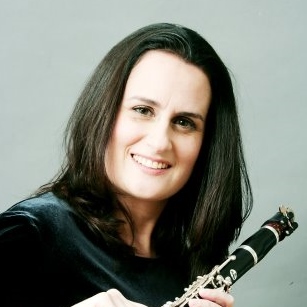click to dowload our latest edition
CLICK HERE TO SUBSCRIBE TO OUR NEWSLETTER


Published
6 years agoon
By
adminJORDAN MOSHE
However, for South African-born internationally acclaimed clarinettist Shelley Levy, the clarinet is the beginning and end of classical music. “My parents bought me my first clarinet and I never looked back,” she says. “I like other instruments, but the clarinet is my instrument.”
Unless you are familiar with instrumental music, the role played by the clarinet may not seem a crucial one. The clarinet is as important to an orchestra as any of its counterparts. This becomes apparent when it is played almost unaccompanied, and its true melodic contribution can be fully appreciated.
Having performed already in Cape Town and Grahamstown last week, Levy performed at the Linder Auditorium in Parktown on Saturday night, proving just how powerful the clarinet can be. Accompanied only by Russian-born pianist Pavel Timofeyefsky, Levy is here at the invitation of the Johannesburg Musical Society, which is celebrating over 100 years of classical music in South Africa.
Levy feels that interest in the clarinet has grown considerably. “In recent years, it has become quite an impressive solo instrument,” she says. “Of all the woodwind instruments, it’s perhaps the most solo. It has a huge range, from the loudest to the softest of notes. It’s used a lot in jazz and is quite a versatile instrument.
“Sometimes you blend and sometimes you’re meant to rise above. Sometimes I’m not important, and sometimes mine is the only instrument being heard.”
Born and raised in Cape Town, Levy last visited South Africa 11 years ago. The youngest of three children, Levy attended Camps Bay Primary and High schools, where she took lessons in piano and recorder. When a wind quintet visited the school, she fell in love with the clarinet immediately.
“I knew that this was my instrument,” she says. “I just fell in love with what it could do, and that was that.”
Under the tutelage of noted musician Oliver de Groot, Levy’s ability grew. She went on to study in Switzerland at the Geneva Conservatoire. Levy says: “I had never left the country until I was 21, so it was difficult but exciting. When I joined a class in Holland with 20 other clarinettists, it was a bit of a shock because we felt we were all different. But then you start to feel a connection through music and learn from them as people and players.”
Levy adds: “When you play alongside someone, you develop a special connection with them. You give something, they respond to it, and then you reverse the roles. The different players I’ve come across throughout the years bring something different to my playing. You are enriched, and that comes through in your music.”
Despite never doubting her passion for music for a second, Levy did not give much thought to a future in music. After completing three years of study in Geneva, she continued with postgraduate study in London, and that’s where she stayed. “I wanted to be the best I could possibly be. And I did just that.”
Although she feels comfortable living in London, Levy admits that she welcomes the opportunity to reconnect with her South African roots. “You carry on with life in Europe and feel that that is your home,” she says. “But then you come back here and feel the warmth of South Africans and their hospitality, and feel you can be who you really are.
“When I come here I always ask myself how I survive the weather in London. How have I coped and why did I do it?” she laughs.
As a proud South African, Levy feels that local musicians have much to offer the international music industry, and have the opportunity to contribute something unique in music. “South Africans are doing incredibly well overseas,” says Levy. “Players across the globe come from South Africa. Sweden France, Germany, every country I can think of features South African talent. South Africans are hard workers who have had to struggle to get to where they are, but because of that they have an edge, which people appreciate.”
However, Levy acknowledges that musicians constantly face difficulties. “There are musical challenges because you always want to raise your playing level, strive for more colours in music. And it’s difficult workwise, because you have no choice but to promote yourself and try to get work. It is not just about the playing.”
Despite the professional difficulties, Levy remains committed to her calling and relishes each opportunity she has to play. “I enjoy each concert for what it is. The opportunity to play alongside different people and meeting great musicians is what I always look forward to.
“The tradition of music in Judaism is far deeper than something superficial. It’s something we carry in our souls, a dark expressiveness created by the experiences through which the Jewish people have lived. Although I don’t always think about it, I think I carry it. Jewish people have a deep expressiveness, and it is certainly a source of inspiration for me.”
Levy says that interest in classical music remains strong among the younger generations, and that a future for the genre seems bright. “There are a lot of young people who attend classical music concerts,” she says. “Young players continue stepping forward, music remains a part of certain school curricula, and the culture of classical music in general seems to be strong.
“There are financial problems in the world which affect the arts, and music schools have felt the cut. But we remain hopeful and believe there is a positive future for classical music.”
